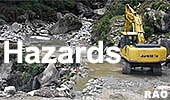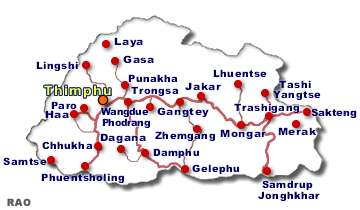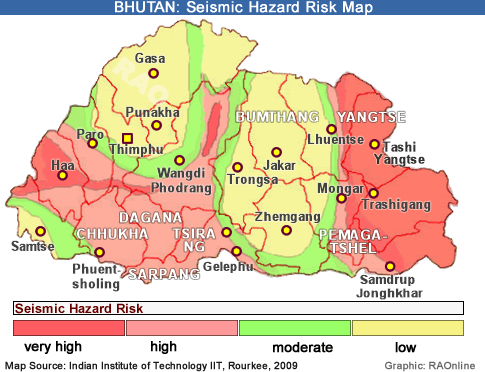| Natural Hazards in Bhutan |
 |
Bhutan Earthquakes |
 |
Sikkim Quake 2011 |
|
 |
Bhutan Earthquakes |
|
|
 |
|
Seismic Stations in Bhutan
|
 |
Even as information is being gathered on the extent of damage caused by the September 18 tremors originating from a 6.9 magnitude quake in north Sikkim, no one knows for sure what was the intensity felt in Bhutan.
This is because relevant government agencies do not have a seismometer, a device that measures earthquakes.
 |
|
Although the government prioritised the need to set up seismic stations, after eastern Bhutan was hit by the quake in September 2009, and announced last November that Nu 67M had been allocated to set up 10 stations in the next few years, progress has been slow.
Only last month the seismology section within the department of geology and mines was upgraded to a division, but is short of funds and human resources and equipment.
|
|
"We don't even have a head for the division," the division's acting head, Phuntsho Pelgay, said. "We've proposed to civil service commission for six professionals, three technicians and a support staff, including the head of the division."
Earthquake expert Dr Karma Kuenza, who was supposed to head the division, has now joined Druk Holding and Investment.
The DGM has submitted a proposal titled "Bhutan National Earthquake Observatory and National Capacity Building" to the Norwegean embassy in New Delhi for funding. If accepted, the division will work in collaboration with the Norwegean seismic array (NORSAR)in installing the seismic stations and training the workers.
 |
|
In 2001, five seismic stations from University of Texas, El Paso, were set up temporarily in Bhutan for 15 months. The temporary seismic network detected 1,600 teleseismic, regional and local events when the US geological survey (USGS), which is global, detected only 700. "Local seismic stations are much more effective in this case," division officials said.
|
|
Two seismic stations used by the WAPCOS limited, an international consultant for water resources, power and infrastructure development for Tala hydroelectric project, have been handed over to the DGM.
"As of now, we have only one expert in our division and he can't do anything as he's alone," Phuntsho Pelgay, said. The seismology division was expected to set up five of the ten seismic stations in the country within the current plan that would cost about Nu 32M.
"We're short of human resources and setting up a seismic network can't be done overnight," Phuntsho Pelgay said. During the midterm review in November last year, Dr Karma Kuenza made a five-minute presentation to indicate that Bhutan lies in a seismically active region of the world, where the average magnitude of earthquakes is around four to five on the Richter scale.
Karma Kuenza also juxtaposed the Haiti quake that killed an estimated people of 250,000 to 700 in Chile quake, which was of a higher magnitude, to indicate that Chile was prepared.
He had also said that experts have concluded that an earthquake magnitude of eight may strike the seismically active front of the Himalayas very soon, to relieve the seismic strain building up along the contact points of the shifting Asian and Indian sub continental plates.
He pointed out that Bhutan must build its own seismic data that can be used to make predictions, and this will require measuring not only the strong quakes, but the smaller ones as well that occur all the time.
 |
| Contributed by Tenzin Namgyel, KUENSEL, Bhutan's national newspaper, 22 September 2011 |
| Links |
 |
 |
 |
External
links |
top
| Information on Bhutan |
 |
|






